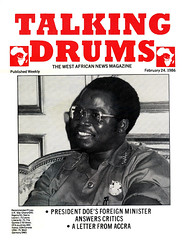What The Papers Say
New Nigerian, February 17th, 1986
Scramble for OATUU
Against the backdrop of the leadership tussle and cynicism that marked last year's Lagos meetings of the Organisation of African Trade Union Unity (OATUU), it was hardly surprising that its Accra meeting ended in a shameful breakup. Given the stupendous allegations of fraud, mismanagement and external manipulations in Lagos, it was clear the success of that conference would be predicated on the co-operation and good will of all member nations. But it was such a pity that because of lack of support from most member nations the All Chiroma caretaker committee could not do the much needed groundwork.Particularly reprehensible were the roles of Ghana and Libya in the sordid affair. It was baffling that these two seemingly 'progressive' African nations could go the whole hog to support discredited OATUU secretary-general, Mr Dennis Akumu, and his team in their intransigent refusal to submit to accountability after 13 years in office.
Since the issue of accountability had all along been at the centre of OATUU's crisis there was no earthly reason why it could not have been properly hammered out before the election. The onus to do so lay heavily on Ghana as the host government. But it balked. And instead saw the opportunity to malign Nigeria and pour irresponsible invectives on her representatives.
Libya's overbearing meddlesomeness in the OATUU affair was not unexpected. Since the Lagos meeting, the allegations have been rife that Libya was bankrolling the organisations. And in a previous editorial (22-1-85) we had warned of the dangers in allowing a single nation to do so. Both Ghana and Libya cannot impress anybody with the argument that their disgraceful behaviour was informed by the need to save OATUU from imperialist penetrations. That in our view is an unacceptable way of handling the issue of external influences in the organisation's affairs. In any case a divided OATUU is more vulnerable to external manipulations. Moreover, a disintegrated OATUU is capable of giving credence to the erroneous imperialist notion that Africans are incapable of running continental organisations.
All said, the factionalization of OATUU is not in the best interest of Pan African trade unionism. It ought to be a thing of grief to all genuine lovers of the continent. That is why we urge both the Hassan Sunmonu and the Ali Nefeshy factions to face the real issues. No one must give in to a celebration of 'victory' or the illusion of being the "authentic and constitutional OATUU". The breakup of the organisation must be seen for what it is - a defeat for the entire continent. The OAU must help the OATUU leadership to put a wedge to this sham.
The Punch, Nigeria, February 17, 1986
Citizen Evwievugha of Sapele
Governments, whenever they want to fan the embers of nationalism in their citizens, quickly grab John F. Kennedy's historic injunction, "ask not what your country can do for you, but what you can do for your country."But today we ask, "Aren't there occasions when the citizens can challenge their government, 'ask not what your citizens can do for you but what you can do for your citizens"?"
We pose the above question on behalf of citizen Evwode Evwievugha of Sapele in Bendel State. Citizen Evwievugha, a peasant farmer, had a set of quadruplets added to his family of five on August 2, 1985. As expected, the joy that would have been heralded by childbirth was turned to sadness as a result of the austere times.
Citizen Evwievugha is not the only victim of circumstances, occasioned by the arrival of multiple babies. In almost all cases, these victims have depended on gifts and assistance from public spirited individuals and philanthropic organisations for their survival.
Is it really proper that such a situation should persist in 20th century Nigeria? We may not be in a socialist state, neither are we operating a welfarist system. But can't we provide the basic facilities that make life worth living and meaningful and human life more dignifying?
A situation where the society allows its citizens to be born into poverty and nurtured on doles from charity is, to put it mildly, despicable. Rudimentary decency demands that the society should take care of its citizens right from birth. This definitely involves the provision of basic amenities. In some developed countries, children are entitled to their up-keep allowance, free meals at school, free education, etc. Parents are entitled to unemployment allowance and some other social welfare benefits like subsidised rents for the poor.
We are not asking for all these in view of our level of economic development and the present austere condition.
But we do not think it is too much to ask our governments to make provision for some allowance to enable parents of multiple births to cater for their offspring. Such allowance should be given according to the number of babies for a period of not less than four years.
It is immoral and dehumanising to abandon our citizens who have multiple babies to depend solely on charity. The Federal Government, through the various ministries of social welfare, should come up with a concrete plan to save such parents from the humiliating circumstances of a beggarly existence.
